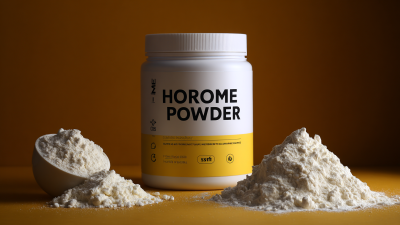In recent years, the significance of steroidal hormones has surged, captivating attention across various sectors, from pharmaceuticals to digital health technology. As we anticipate the trends of 2025, understanding the role of these hormones in therapeutic applications and personal health management becomes paramount. According to a report by Grand View Research, the steroid hormones market was valued at approximately $95 billion in 2020 and is projected to grow at a CAGR of 6.2% from 2021 to 2028. This trajectory underscores the expanding relevance and prevalence of steroid hormone therapies in modern health practices.

Dr. Emily Johnson, a prominent endocrinologist and a leading authority in the field of hormonal research, emphasizes the transformative potential of steroidal hormones, stating, "The advancements in our understanding of steroidal hormones not only pave the way for innovative treatments but also empower individuals to take charge of their hormonal health." Such insights signal a dynamic future wherein digital platforms will play a key role in monitoring and managing hormonal levels, potentially revolutionizing patient care and outcomes.
As we explore the intersection of steroidal hormones and digital technology, it is crucial to delve into the underlying mechanisms and implications for healthcare trends. The insights derived from this exploration will not only inform medical professionals but will also equip consumers with the knowledge necessary to navigate their health journeys in an increasingly complex digital landscape.
As we approach 2025, the intersection of steroidal hormones and digital health innovations presents a transformative opportunity in personalized medicine. Steroidal hormones, which play crucial roles in various physiological processes, can influence health outcomes significantly. By harnessing data regarding individual hormone levels, digital health technologies such as wearables and mobile health applications can offer tailored insights, empowering users to manage their health proactively.

Innovations in digital platforms are enabling real-time monitoring of hormonal fluctuations, allowing for timely interventions that can prevent potential health issues. For instance, applications that analyze hormonal data in conjunction with lifestyle factors—such as sleep patterns, stress levels, and diet—can provide actionable recommendations. This integration of steroidal hormone tracking within digital health ecosystems not only enhances user engagement but also fosters a more holistic approach to health management, laying the groundwork for more effective treatments and wellness strategies in the years to come.
The field of hormonal research is witnessing a transformative shift, driven by emerging technologies that promise to enhance our understanding of steroidal hormones and their personalized applications. Innovations in genomics and bioinformatics are paving the way for more precise hormonal profiling, allowing researchers to analyze individual genetic variations that influence hormonal responses. This personalized approach not only aids in identifying hormonal imbalances but also enables tailored treatment options that can maximize therapeutic efficacy and minimize side effects.
Moreover, advancements in artificial intelligence and machine learning are revolutionizing data analysis in hormonal research. These technologies can sift through vast datasets to identify patterns and correlations that may not be immediately evident. As a result, healthcare providers can better predict patient responses to hormone therapies, leading to more effective and individualized health interventions. With continued investment in these areas, the integration of technology into hormonal research is set to redefine the landscape by 2025, opening doors to new possibilities in health and wellness management.
The convergence of artificial intelligence (AI) and steroidal hormones is poised to revolutionize the healthcare landscape by 2025. As AI technologies advance, they enable more precise analysis of hormonal interactions and their effects on human health. For instance, machine learning algorithms can be utilized to predict how variations in steroidal hormone levels might contribute to conditions like obesity, osteoporosis, and hormonal disorders. This predictive capability allows for more personalized treatment plans, tailored to individual hormonal profiles, enhancing therapeutic outcomes.
Moreover, AI-powered tools can streamline the drug discovery process for steroidal therapies, identifying potential candidates that would have traditionally taken years to discover. By simulating interactions of various compounds with hormonal pathways, researchers can efficiently pinpoint effective interventions. This not only accelerates the time frame for bringing new steroidal drugs to market but also fosters innovation in hormonal treatments, ultimately leading to better patient care and health management strategies. Consequently, the intersection of AI and steroidal hormones signals a new era in healthcare that promises to optimize treatment efficacy and improve the quality of life for patients worldwide.
| Trend | Description | Impact on Healthcare | AI Application | Projected Growth (% by 2025) |
|---|---|---|---|---|
| Personalized Hormone Therapy | Custom treatments based on individual hormonal profiles. | Improves treatment effectiveness and reduces side effects. | AI algorithms analyze hormone levels to recommend personalized treatments. | 25% |
| Hormonal Health Monitoring | Continuous tracking of hormone levels through wearable devices. | Enables proactive healthcare management. | AI analyzes data from wearable devices to identify health trends. | 30% |
| AI in Hormonal Research | Using AI to accelerate research in steroidal hormone effects. | Expedites the discovery of new therapies and treatments. | Machine learning models predict outcomes of hormonal therapies. | 40% |
| AI-Driven Mental Health Solutions | Utilizing AI to tackle hormonal imbalances affecting mental health. | Improves mental health outcomes by addressing hormonal issues. | AI chatbots and apps provide resources and treatment suggestions. | 35% |
| Regenerative Medicine and Hormones | Linking hormones with regenerative therapy approaches. | Potential for advanced healing processes and recovery. | AI models identify optimal hormone therapies to enhance regeneration. | 20% |
The use of steroidal hormones in digital health applications opens up a plethora of opportunities, yet it also raises significant regulatory challenges and ethical considerations. As the market for hormone-related data continues to expand, projected to reach $5 billion by 2025 according to the Global Hormones Market Report, the necessity for stringent regulations has never been more pressing. Regulatory bodies must grapple with ensuring data privacy, especially given that hormonal levels can reveal sensitive health information about individuals. Reports indicate that more than 70% of consumers express concerns over how their health data is being utilized by third parties, highlighting the need for transparent practices and robust data protection laws.
Furthermore, ethical dilemmas arise in the use of hormonal data, particularly around consent and the potential misuse of information. As businesses increasingly integrate artificial intelligence and machine learning to analyze hormonal data, there is a risk of reinforcing biases, particularly if these technologies are not adequately regulated. Industry research indicates that nearly 60% of healthcare professionals believe that ethical guidelines are lagging behind technological advancements, underscoring the urgent need for a multi-stakeholder approach to address these challenges. Ensuring ethical compliance and fostering public trust will be critical as we navigate the future landscape of hormonal data usage in digital health.
This chart illustrates the regulatory challenges and ethical considerations surrounding the usage of hormonal data, highlighting the increasing concerns from 2020 to 2025.
In recent years, there has been a significant shift towards consumer awareness regarding the effects of steroidal hormones and their role in overall wellbeing. With the proliferation of cosmetic products and perfumes, concerns about the health implications have escalated. According to a narrative review published on the impact of these substances, many consumers are unaware that the products they choose can influence hormonal balance and overall health. As we approach 2025, educating the public on how these hormones interact with various products is crucial for informed decision-making.

A staggering report indicates that approximately 10% of medicines in low- and middle-income countries are either substandard or falsified, raising alarms about the authenticity and safety of health-related products, including cosmetics that may contain hormone disruptors. With 60% of consumers actively seeking out information on ingredient transparency, brands that prioritize education on steroidal hormones are likely to thrive. As digital trends evolve, leveraging technology to provide clear and accessible information about product ingredients will empower consumers and enhance their wellness journeys.






